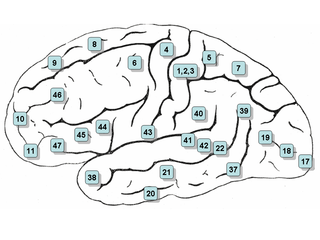Psychology is the scientific study of mind and behavior. Its subject matter includes the behavior of humans and nonhumans, both conscious and unconscious phenomena, and mental processes such as thoughts, feelings, and motives. Psychology is an academic discipline of immense scope, crossing the boundaries between the natural and social sciences. Biological psychologists seek an understanding of the emergent properties of brains, linking the discipline to neuroscience. As social scientists, psychologists aim to understand the behavior of individuals and groups.

Behavioral economics is the study of the psychological factors involved in the decisions of individuals or institutions, and how these decisions deviate from those implied by traditional economic theory.

Neurolinguistics is the study of neural mechanisms in the human brain that control the comprehension, production, and acquisition of language. As an interdisciplinary field, neurolinguistics draws methods and theories from fields such as neuroscience, linguistics, cognitive science, communication disorders and neuropsychology. Researchers are drawn to the field from a variety of backgrounds, bringing along a variety of experimental techniques as well as widely varying theoretical perspectives. Much work in neurolinguistics is informed by models in psycholinguistics and theoretical linguistics, and is focused on investigating how the brain can implement the processes that theoretical and psycholinguistics propose are necessary in producing and comprehending language. Neurolinguists study the physiological mechanisms by which the brain processes information related to language, and evaluate linguistic and psycholinguistic theories, using aphasiology, brain imaging, electrophysiology, and computer modeling.
Radical behaviorism is a "philosophy of the science of behavior" developed by B. F. Skinner. It refers to the philosophy behind behavior analysis, and is to be distinguished from methodological behaviorism—which has an intense emphasis on observable behaviors—by its inclusion of thinking, feeling, and other private events in the analysis of human and animal psychology. The research in behavior analysis is called the experimental analysis of behavior and the application of the field is called applied behavior analysis (ABA), which was originally termed "behavior modification."

Usability can be described as the capacity of a system to provide a condition for its users to perform the tasks safely, effectively, and efficiently while enjoying the experience. In software engineering, usability is the degree to which a software can be used by specified consumers to achieve quantified objectives with effectiveness, efficiency, and satisfaction in a quantified context of use.
Introspection is the examination of one's own conscious thoughts and feelings. In psychology, the process of introspection relies on the observation of one's mental state, while in a spiritual context it may refer to the examination of one's soul. Introspection is closely related to human self-reflection and self-discovery and is contrasted with external observation.
Participant observation is one type of data collection method by practitioner-scholars typically used in qualitative research and ethnography. This type of methodology is employed in many disciplines, particularly anthropology, sociology, communication studies, human geography, and social psychology. Its aim is to gain a close and intimate familiarity with a given group of individuals and their practices through an intensive involvement with people in their cultural environment, usually over an extended period of time.
Experimental psychology refers to work done by those who apply experimental methods to psychological study and the underlying processes. Experimental psychologists employ human participants and animal subjects to study a great many topics, including sensation, perception, memory, cognition, learning, motivation, emotion; developmental processes, social psychology, and the neural substrates of all of these.

Active learning is "a method of learning in which students are actively or experientially involved in the learning process and where there are different levels of active learning, depending on student involvement." Bonwell & Eison (1991) states that "students participate [in active learning] when they are doing something besides passively listening." According to Hanson and Moser (2003) using active teaching techniques in the classroom can create better academic outcomes for students. Scheyvens, Griffin, Jocoy, Liu, & Bradford (2008) further noted that "by utilizing learning strategies that can include small-group work, role-play and simulations, data collection and analysis, active learning is purported to increase student interest and motivation and to build students ‘critical thinking, problem-solving and social skills". In a report from the Association for the Study of Higher Education, authors discuss a variety of methodologies for promoting active learning. They cite literature that indicates students must do more than just listen in order to learn. They must read, write, discuss, and be engaged in solving problems. This process relates to the three learning domains referred to as knowledge, skills and attitudes (KSA). This taxonomy of learning behaviors can be thought of as "the goals of the learning process." In particular, students must engage in such higher-order thinking tasks as analysis, synthesis, and evaluation.

Human subject research is systematic, scientific investigation that can be either interventional or observational and involves human beings as research subjects, commonly known as test subjects. Human subject research can be either medical (clinical) research or non-medical research. Systematic investigation incorporates both the collection and analysis of data in order to answer a specific question. Medical human subject research often involves analysis of biological specimens, epidemiological and behavioral studies and medical chart review studies. On the other hand, human subject research in the social sciences often involves surveys which consist of questions to a particular group of people. Survey methodology includes questionnaires, interviews, and focus groups.
In psychology and behavioral economics, the endowment effect, also known as divestiture aversion, is the finding that people are more likely to retain an object they own than acquire that same object when they do not own it. The endowment theory can be defined as "an application of prospect theory positing that loss aversion associated with ownership explains observed exchange asymmetries."
Applied behavior analysis (ABA), also referred to as behavioral engineering, is a psychological discipline that utilizes the principles of learning based upon respondent and operant conditioning to change socially significant behavior. ABA is the applied form of behavior analysis. The impact ABA has on meaningful behaviors is a defining feature, and what differentiates it from experimental analysis of behavior, which focuses on basic experimental research.

Visual sociology is an area of sociology concerned with the visual dimensions of social life.
The goals of experimental finance are to understand human and market behavior in settings relevant to finance. Experiments are synthetic economic environments created by researchers specifically to answer research questions. This might involve, for example, establishing different market settings and environments to observe experimentally and analyze agents' behavior and the resulting characteristics of trading flows, information diffusion and aggregation, price setting mechanism and returns processes.

Field research, field studies, or fieldwork is the collection of raw data outside a laboratory, library, or workplace setting. The approaches and methods used in field research vary across disciplines. For example, biologists who conduct field research may simply observe animals interacting with their environments, whereas social scientists conducting field research may interview or observe people in their natural environments to learn their languages, folklore, and social structures.
Psychological research refers to research that psychologists conduct for systematic study and for analysis of the experiences and behaviors of individuals or groups. Their research can have educational, occupational and clinical applications.
In economics, willingness to accept (WTA) is the minimum monetary amount that а person is willing to accept to sell a good or service, or to bear a negative externality, such as pollution. This is in contrast to willingness to pay (WTP), which is the maximum amount of money a consumer is willing to sacrifice to purchase a good/service or avoid something undesirable. The price of any transaction will thus be any point between a buyer's willingness to pay and a seller's willingness to accept; the net difference is the economic surplus.
Psychological behaviorism is a form of behaviorism—a major theory within psychology which holds that generally human behaviors are learned—proposed by Arthur W. Staats. The theory is constructed to advance from basic animal learning principles to deal with all types of human behavior, including personality, culture, and human evolution. Behaviorism was first developed by John B. Watson (1912), who coined the term "behaviorism", and then B. F. Skinner who developed what is known as "radical behaviorism". Watson and Skinner rejected the idea that psychological data could be obtained through introspection or by an attempt to describe consciousness; all psychological data, in their view, was to be derived from the observation of outward behavior. The strategy of these behaviorists was that the animal learning principles should then be used to explain human behavior. Thus, their behaviorisms were based upon research with animals.
The study of memory incorporates research methodologies from neuropsychology, human development and animal testing using a wide range of species. The complex phenomenon of memory is explored by combining evidence from many areas of research. New technologies, experimental methods and animal experimentation have led to an increased understanding of the workings of memory.
Kathryn M. Zeiler is the Nancy Barton Scholar and Professor of Law at Boston University School of Law. Zeiler's work primarily focuses on health law, torts law, law and economics, medical malpractice, and disclosure law.






